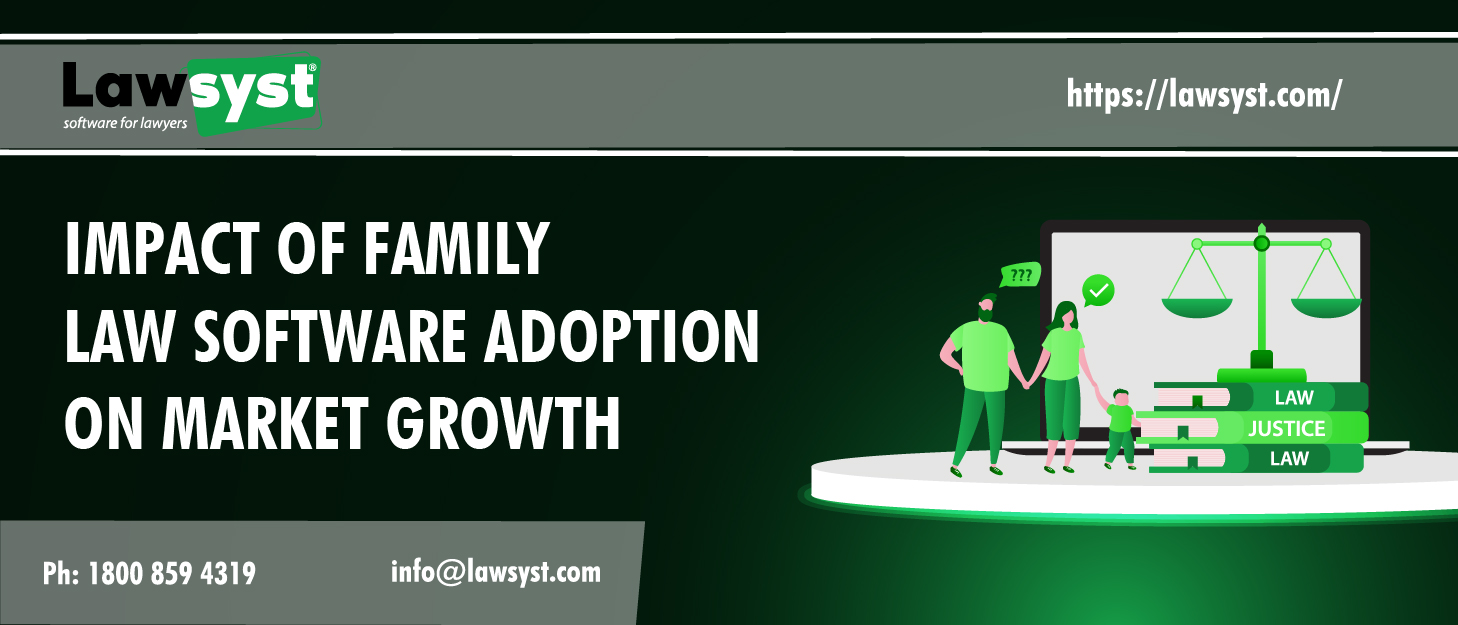Impact of Family Law Software Adoption on Market Growth
Posted On: 9-sep-2024
Created By: Lawsyst Team


In recent years, the legal industry has witnessed a significant transformation, primarily driven by technological advancements. Among these innovations, Family Law Software has emerged as a pivotal tool for law firms specializing in family law. This software not only streamlines operations but also enhances client service, ultimately influencing the growth rate of the overall legal market.
Understanding Family Law Software
Family Law Software is a specialized application designed to assist law firms in managing, reviewing, and tracking legal documents related to family law cases, such as divorces, custody disputes, and property settlements. These cloud-based solutions offer features like document automation, case management, billing, and client communication tools, making them indispensable for modern legal practices.
The Current Market Landscape
The global Family Law Software market is projected to experience substantial growth in the coming years. According to recent studies, the market size is expected to reach approximately $1.785 billion by 2030, with a compound annual growth rate (CAGR) of around 6.3% during the forecast period from 2024 to 2030. This growth is fueled by the increasing demand for efficient legal solutions among solo practitioners, small firms, and larger legal entities alike.
Key Drivers of Adoption
One of the primary reasons law firms are adopting Family Law Software is the significant boost in efficiency it provides. By automating routine tasks such as document preparation and case management, lawyers can focus more on strategic aspects of their cases. This increased productivity not only enhances client satisfaction but also allows firms to take on more cases, directly impacting their revenue and growth.
Cost-Effectiveness
Family Law Software often reduces operational costs by minimizing the need for extensive administrative staff. With features that automate billing and document management, firms can operate leaner, which is particularly beneficial for small and mid-sized practices. This cost-effectiveness makes it easier for these firms to compete with larger firms, thereby increasing market competition and growth.
Improved Client Experience
In the legal field, client satisfaction is paramount. Family Law Software enhances communication between lawyers and clients through client portals and automated updates. This transparency builds trust and encourages referrals, which are crucial for business growth. As more firms recognize the importance of client experience, the demand for such software will continue to rise.
Regulatory Compliance
The legal industry is heavily regulated, and compliance is critical. Family law software often includes features that help firms stay compliant with legal standards and regulations, reducing the risk of costly penalties. This assurance of compliance is a significant selling point for many firms, further driving adoption.
Data Security
With the increasing amount of sensitive information handled by law firms, data security has become a top priority. Family Law Software typically offers robust security features, including encryption and secure cloud storage, which protect client data. As firms become more aware of the risks associated with data breaches, the demand for secure software solutions will likely increase.
Market Growth Projections
The family law
software market is not only growing in size but also in diversity. As more
firms adopt these technologies, we can expect to see a wider range of software
solutions tailored to specific needs within family law. For instance, some
software may focus on mediation processes, while others may specialize in child
custody cases or financial settlements. This diversification will cater to the
unique requirements of different law firms, further driving market growth.
Moreover, the overall legal market is expected to benefit from the increased efficiency and productivity brought about by family law software. As law firms become more efficient, they can handle a higher volume of cases, leading to increased revenue and market expansion. The legal technology sector, including family law software, is projected to grow at a remarkable CAGR, with estimates suggesting growth rates of up to 12% in some segments.
Challenges and Considerations
While the adoption of family law software presents numerous benefits, it is not without challenges. Some law firms may face resistance to change, particularly from older attorneys who are accustomed to traditional methods. Moreover, the initial investment in software can be a barrier for smaller firms. However, as the long-term benefits of increased efficiency and client satisfaction become evident, more firms are likely to overcome these hurdles.
Lawsyst Equipping You with the Essential Tools
Our family law
software, health law software, and immigration law software are tailored
specifically for family law, health law, and immigration law practices,
equipping you with the essential tools to streamline operations and enhance
client service. Our software is designed to simplify complex processes,
allowing you to focus on what matters most your clients.
With features
that automate routine tasks, manage case files, and facilitate communication,
our solutions help reduce administrative burdens and improve workflow. By
integrating our software into your practice, you can expect increased
productivity, better organization, and a more responsive approach to client
needs.
We understand
that each legal practice has unique requirements, which is why Lawsyst is
customizable to fit your specific needs. Whether you are managing family law
cases, navigating health law regulations, or handling immigration matters, our
tools are designed to support your success.
Don’t just take our word for it. Schedule your demonstration today. Experience firsthand how our family law software, health law software, and immigration law software can transform your day-to-day operations, making your practice more efficient and client-focused.
Conclusion
The increasing
adoption of family law software is poised to have a profound impact on the
growth rate of the overall legal market. By enhancing efficiency, reducing
costs, improving client experiences, ensuring compliance, and providing robust
data security, these software solutions are transforming how law firms operate.
As the market continues to evolve, we can expect to see a surge in demand for
Family Law Software, driving not only the growth of this specific market but
also contributing to the overall expansion of the legal industry.